Exhaust Manifold Replacement 1.6L Engine
Removal Procedure
Caution: While engine is operating, the exhaust system will become extremely
hot. To prevent burns avoid contacting a hot exhaust system.
Caution: Unless directed otherwise, the ignition and start switch must be in the OFF or LOCK position, and all electrical loads must be OFF before servicing
any electrical component. Disconnect the negative battery cable to prevent an electrical spark should a tool or equipment come in contact with an exposed electrical terminal. Failure to follow these precautions may result in personal injury and/or damage to
the vehicle or its components.
- Disconnect the negative battery cable.
- Disconnect the heated oxygen sensor (HO2S1) electrical connector.
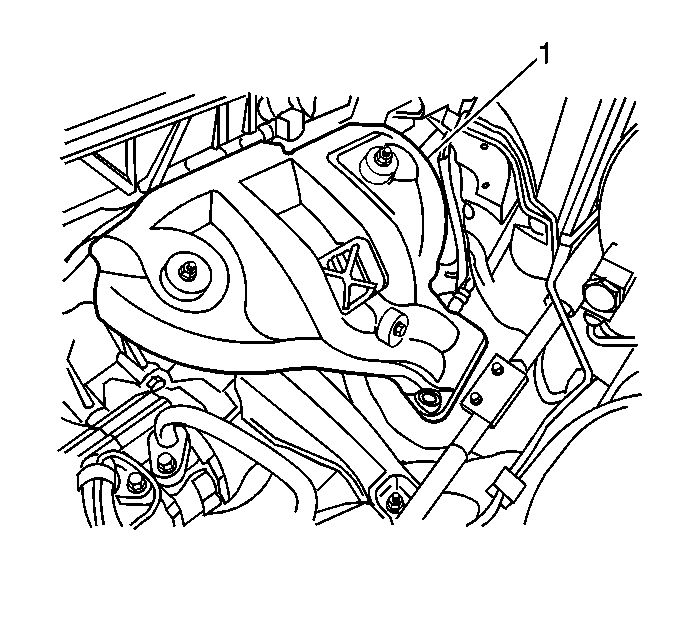
- Remove the following from
the exhaust manifold:
| • | The upper exhaust manifold heat shield (1) |
- Raise and suitably support the vehicle. Refer to
Lifting and Jacking the Vehicle
in General Information.
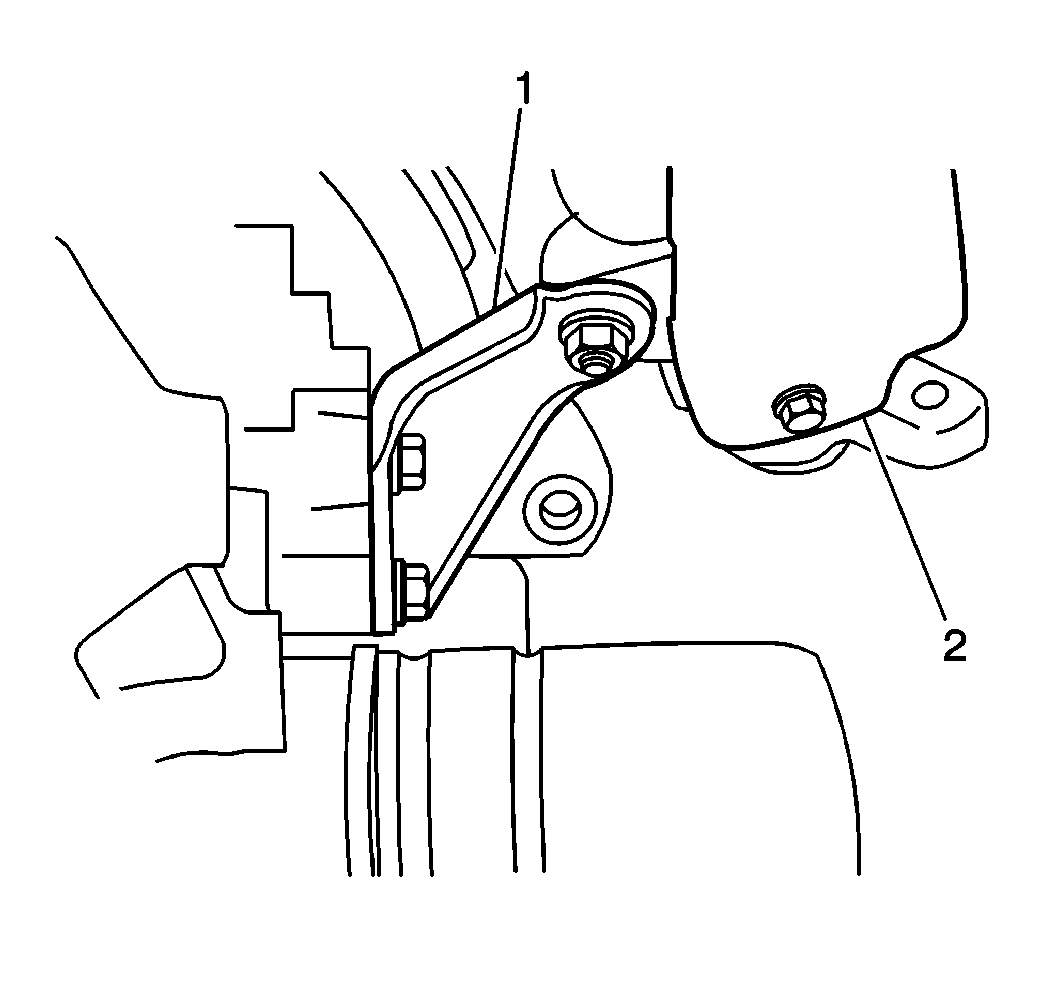
- Remove the following from
the exhaust manifold and engine block:
| • | The exhaust manifold reinforcement bracket (1) |
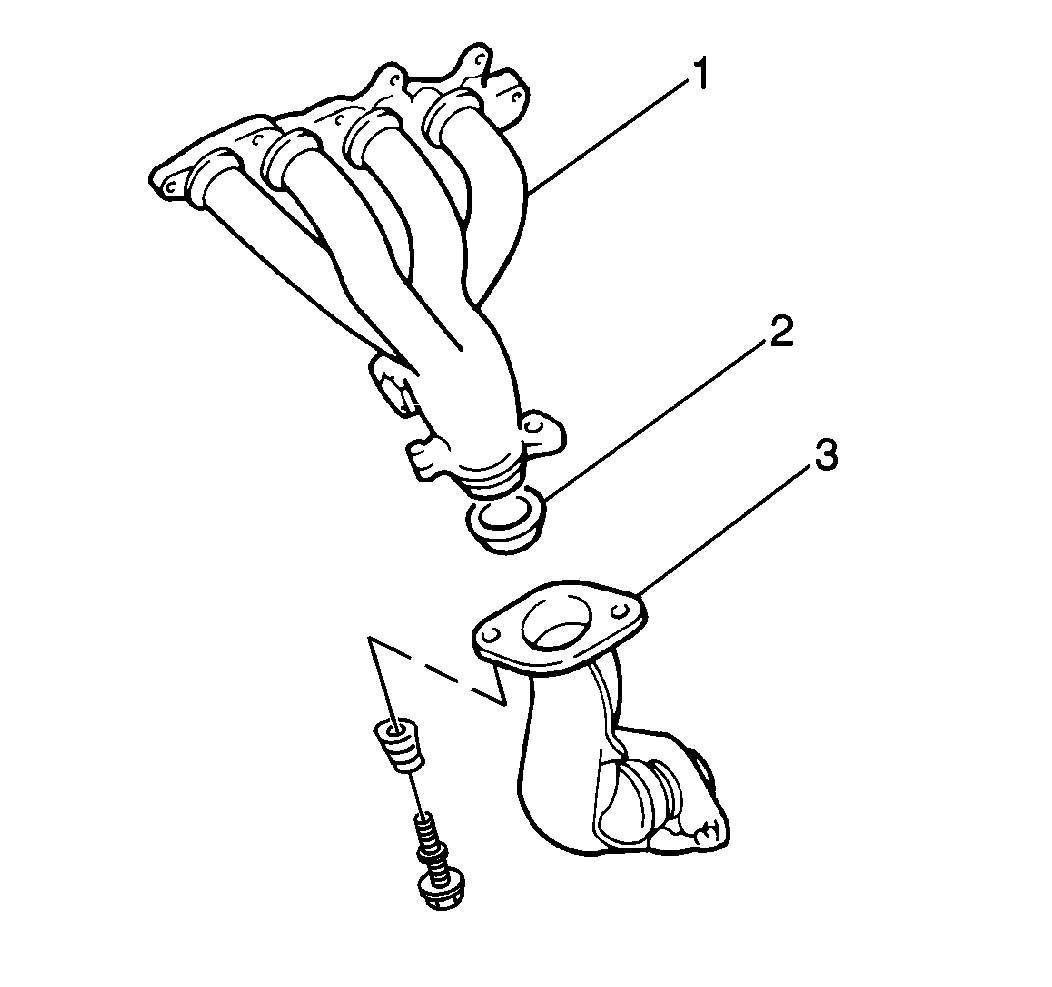
- Remove the following from
the exhaust manifold (1):
| • | The front pipe/three way catalytic converter (TWC) assembly (3) |
- Lower the vehicle.
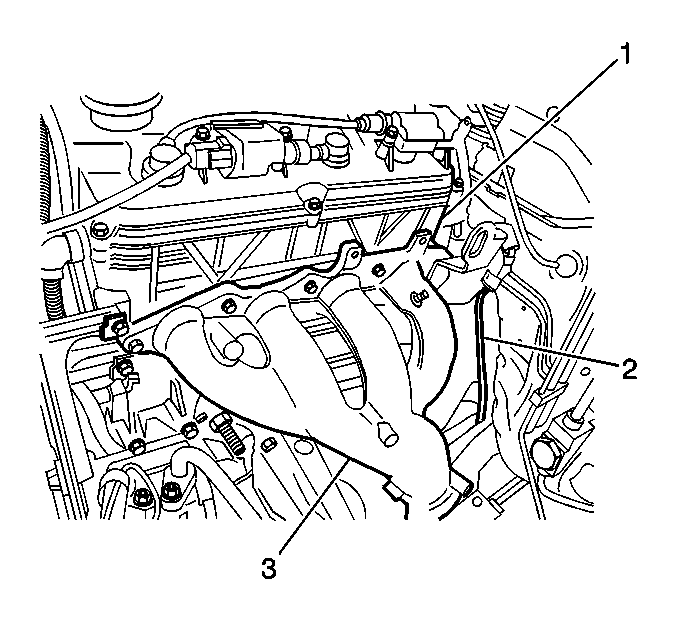
- Remove the 9 nuts
and the lift hook from the exhaust manifold (3).
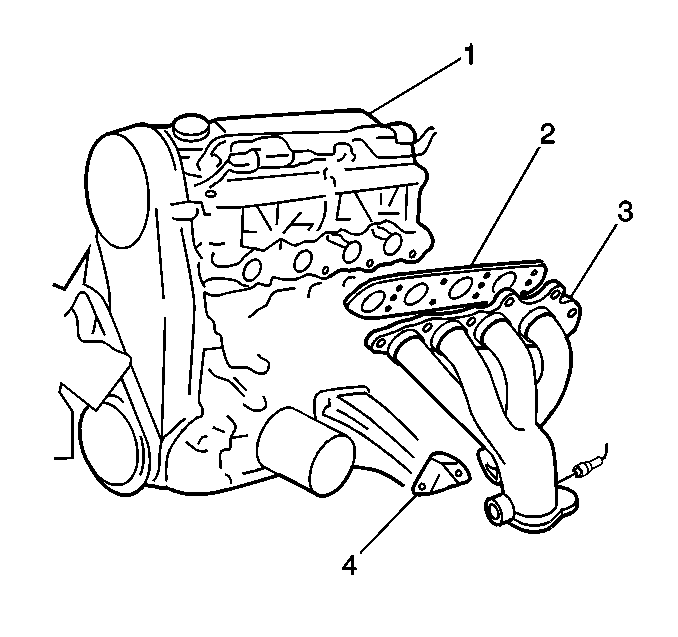
- Remove the exhaust manifold (3)
with the gasket (2).
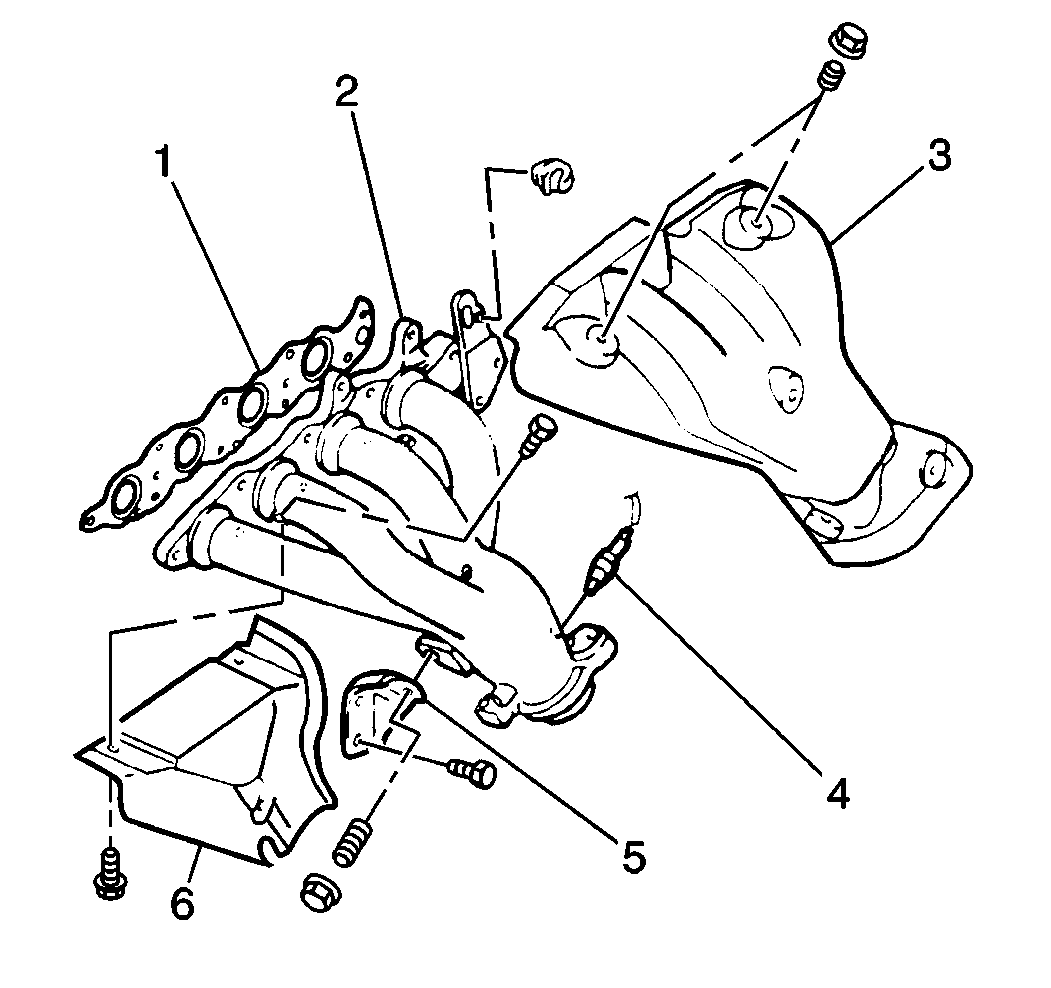
- Remove the three bolts
and lower the exhaust manifold heat shield (6) from the exhaust manifold (2).
- Remove the heated oxygen (HO2S1) Sensor (4) from the exhaust
manifold (2).
- Remove the three way catalytic converter (TWC) front pipe gasket
from the exhaust manifold (2).
Installation Procedure

Notice: Use the correct fastener in the correct location. Replacement fasteners
must be the correct part number for that application. Fasteners requiring
replacement or fasteners requiring the use of thread locking compound or sealant
are identified in the service procedure. Do not use paints, lubricants, or
corrosion inhibitors on fasteners or fastener joint surfaces unless specified.
These coatings affect fastener torque and joint clamping force and may damage
the fastener. Use the correct tightening sequence and specifications when
installing fasteners in order to avoid damage to parts and systems.
- Install the heated oxygen (HO2S1) sensor (4) into the exhaust
manifold (2).
Tighten
Tighten the (HO2S1) Sensor to 43 N·m (32 lb ft).
- Install the 3 bolts and lower the exhaust manifold heat
shield (6) to the exhaust manifold (2).
Tighten
Tighten the lower manifold heat shield bolts to 10 N·m
(89 lb in).

- Install the new exhaust
manifold gasket (2) and the exhaust manifold (3).

- Install the engine hanger (3)
to the cylinder head. Secure the exhaust manifold and hanger with 9 nuts (1).
Tighten
Tighten the exhaust manifold nuts to 23 N·m (17 lb ft).
- Raise and support the vehicle. Refer to
Lifting and Jacking the Vehicle
in General Information.

- Install the front pipe/TWC
assembly (3) with a new gasket (2) to the exhaust manifold (1).
Secure the assembly with 2 bolts.
Tighten
Tighten the exhaust manifold-to-front pipe/TWC assembly bolts to 50 N·m
(37 lb ft).

- Install the exhaust manifold
brackets (1) to the exhaust manifold and the engine block. Secure
the brackets with 1 nut and 2 bolts.
Tighten
| • | Tighten the engine mount-to-exhaust bracket bolts to 54 N·m
(40 lb ft). |
| • | Install the exhaust bracket-to-exhaust manifold nut to 50 N·m
(37 lb ft). |
- Lower the vehicle.

- Install the upper exhaust
manifold heat shield (1) to the exhaust manifold. Secure the heat
shield with 2 nuts and 3 bolts.
Tighten
Tighten the upper exhaust manifold heat shield nuts and bolts to 10 N·m
(89 lb in).
- Connect the (HO2S1) electrical connector.
- Connect the negative battery cable.
Tighten
Tighten the negative battery cable bolt to 15 N·m (11 lb ft).
Exhaust Manifold Replacement 2.0L Engine
Removal Procedure
Caution: In order to avoid being burned, do not service the exhaust system while
it is still hot. Service the system when it is cool.
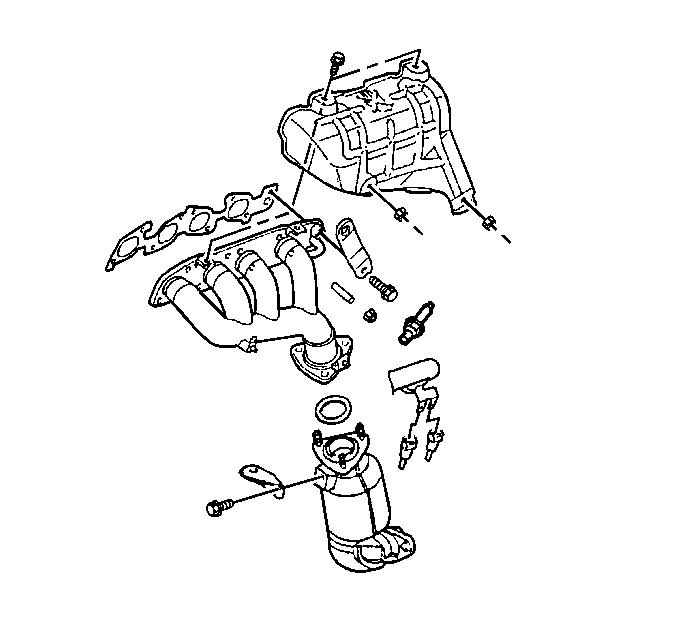
Important: California emissions vehicles are equipped with an additional catalytic
converter (PUP catalytic converter) and a different exhaust manifold from
federal emissions vehicles.
- Perform the following if the vehicle is equipped with the PUP catalytic
converter:
| 1.1. | Remove the 3 bolts and 2 nuts and remove the exhaust manifold
heat shield from the exhaust manifold. |
| 1.2. | Remove the 3 nuts and separate the front pipe/catalytic converter
assembly from the exhaust manifold. |
| 1.3. | Remove the engine mount-to-front pipe/catalytic converter assembly
bracket. |
| 1.4. | Remove the exhaust manifold-to-engine block bracket. |
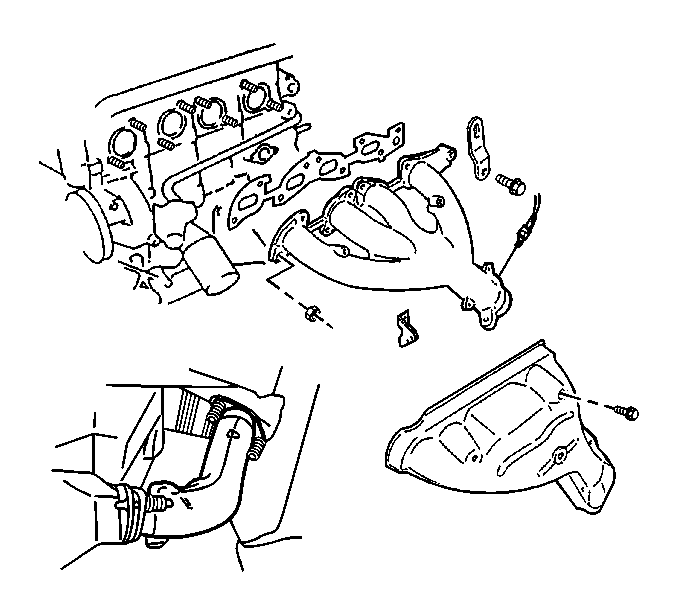
- Perform the following
if the vehicle is not equipped with the PUP catalytic converter:
| 2.1. | Remove the 4 bolts and 1 nut and the exhaust manifold heat shield. |
| 2.3. | Remove the two bolts and separate the front pipe assembly from
the exhaust manifold. |
| 2.5. | Remove the exhaust manifold-to-engine block bracket. |
- Disconnect the oxygen sensor electrical connector.
- Remove the oxygen sensor from the exhaust manifold.
- Remove the 1 bolt and 8 nuts from the exhaust manifold.
- Remove the exhaust manifold, the engine lift hook, and the gasket
from the cylinder head.
Installation Procedure

- Perform the following
if the vehicle is equipped with the PUP catalytic converter:
| 1.1. | Install the new exhaust manifold gasket to the cylinder head. |
Notice: Use the correct fastener in the correct location. Replacement fasteners
must be the correct part number for that application. Fasteners requiring
replacement or fasteners requiring the use of thread locking compound or sealant
are identified in the service procedure. Do not use paints, lubricants, or
corrosion inhibitors on fasteners or fastener joint surfaces unless specified.
These coatings affect fastener torque and joint clamping force and may damage
the fastener. Use the correct tightening sequence and specifications when
installing fasteners in order to avoid damage to parts and systems.
| 1.2. | Install the exhaust manifold and the engine lift hook to the cylinder
head. Secure the exhaust manifold with the 8 nuts and 1 bolt. |
Tighten
Tighten the 8 nuts and 1 bolt to 50 N·m (37 lb ft).
| 1.3. | Connect the lower exhaust pipe to the exhaust manifold with a
new gasket. Secure with the 3 nuts. |
Tighten
Tighten the 3 nuts to 50 N·m (37 lb ft).
| 1.4. | Install the exhaust manifold heat shield to the exhaust manifold.
Secure the exhaust manifold heat shield with 3 bolts and 2 nuts. |

- Perform the following
if the vehicle is not equipped with the PUP catalytic converter:
| 2.1. | Install the new exhaust manifold gasket to the cylinder head. |
| 2.2. | Install the exhaust manifold and the engine lift hook to the
cylinder head. Secure the exhaust manifold with the 1 bolt and the 8 nuts. |
Tighten
Tighten the 8 nuts and 1 bolt to 50 N·m (37 lb ft).
| 2.4. | Install the front pipe assembly to the exhaust manifold with
a new seal. Secure the assembly with the two bolts. |
Tighten
Tighten the exhaust manifold-to-front pipe assembly bolts to 50 N·m
(37 lb ft).
| 2.6. | Install the exhaust manifold-to-engine block bracket. |
| 2.7. | Install the exhaust manifold heat shield to the exhaust manifold.
Secure the exhaust manifold heat shield with 4 bolts and 1 nut. |
- Apply anti-seize compound to the threads of the oxygen sensor.
- Install the oxygen sensor.
Tighten
Tighten the oxygen sensor to 45 N·m (33 lb ft).
- Connect the oxygen sensor electrical connector.
- Inspect the exhaust system for exhaust gas leakage.
Exhaust Manifold Replacement 2.5L Engine, Right Side
Removal Procedure
- Remove the air cleaner upper case and intake air hose.
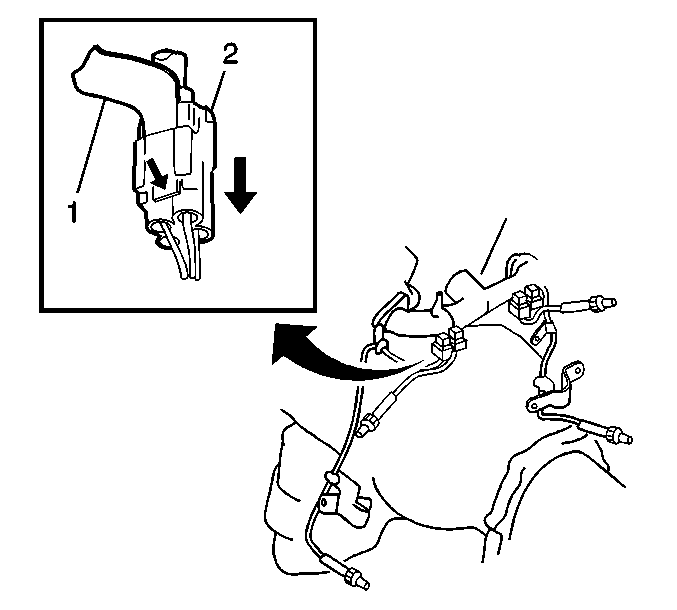
- Detach the oxygen sensor
couplers from the mounting bracket (1) and disconnect the oxygen sensor
(HO2S1) electrical connectors (2).
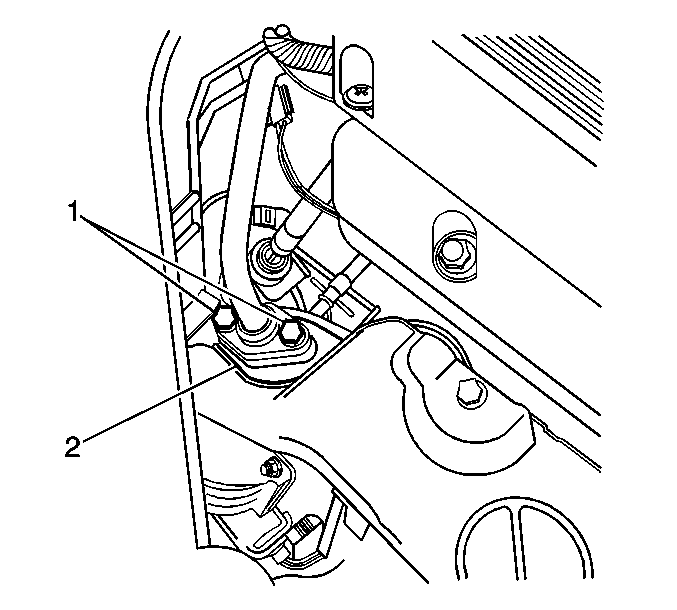
- Disconnect the EGR pipe (1)
from the exhaust manifold (2).
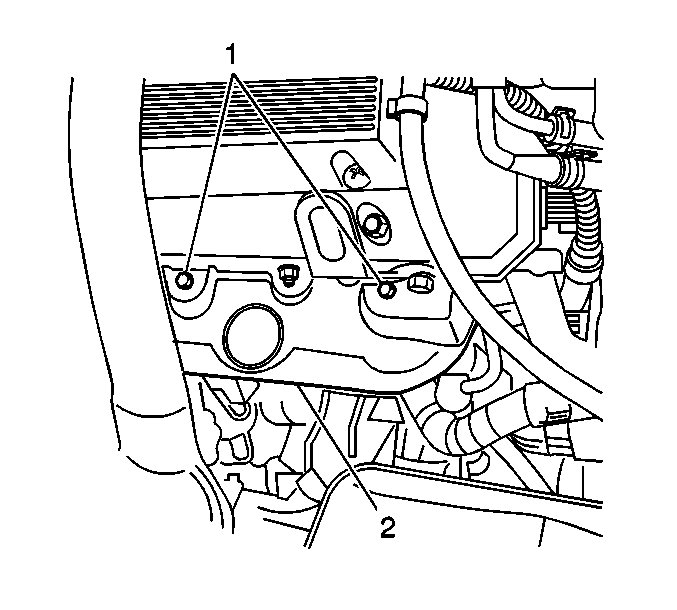
- Remove the exhaust manifold
cover bolts (1) and the cover (2).
- Raise and suitably support the vehicle. Refer to
Lifting and Jacking the Vehicle
in General Information.
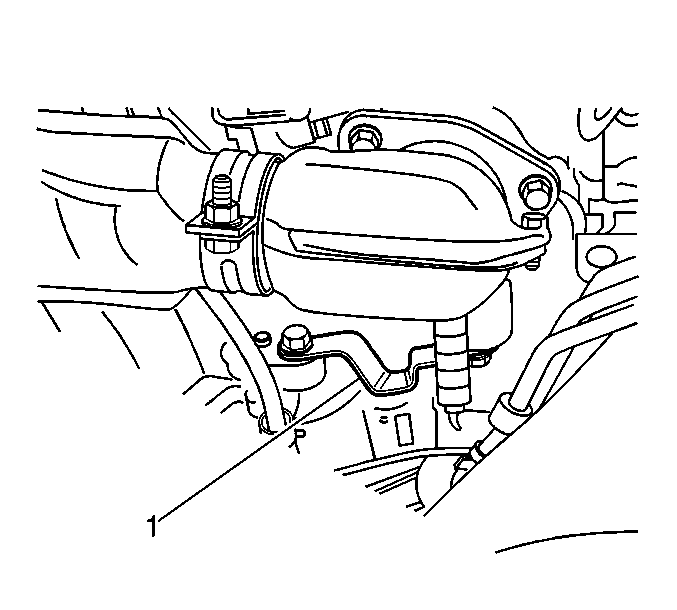
- Remove the following from
the exhaust manifold and engine block:
| • | The exhaust manifold reinforcement bracket (1) |
- Remove the front pipe. Refer to
Front Pipe Replacement
.
- Lower the vehicle.
- Remove the nuts and bolts from the exhaust manifold.
- Remove the exhaust manifold with the gasket.
Installation Procedure
Notice: Use the correct fastener in the correct location. Replacement fasteners
must be the correct part number for that application. Fasteners requiring
replacement or fasteners requiring the use of thread locking compound or sealant
are identified in the service procedure. Do not use paints, lubricants, or
corrosion inhibitors on fasteners or fastener joint surfaces unless specified.
These coatings affect fastener torque and joint clamping force and may damage
the fastener. Use the correct tightening sequence and specifications when
installing fasteners in order to avoid damage to parts and systems.
Important: When installing a new exhaust system component, always use new gaskets
and seals.
- Install the exhaust manifold with a new gasket.
Tighten
Tighten the manifold bolts and nuts to 30 N·m (21.5 lb ft).
- Raise and suitably support the vehicle. Refer to
Lifting and Jacking the Vehicle
in General Information.
- Install the front pipe. Refer to
Front Pipe Replacement
.

- Install the exhaust manifold
reinforcement bracket to the exhaust manifold and engine block:
Tighten
| • | Tighten the engine mount-to-exhaust bracket bolt (1) to
54 N·m (40 lb ft). |
| • | Tighten the exhaust bracket-to-exhaust manifold nut (2)
to 50 N·m (37 lb ft). |
- Lower the vehicle.

- Install the exhaust manifold
cover (2) and the cover bolts (1).
Tighten
Tighten the lower manifold heat shield bolts to 10 N·m
(89 lb in).

- Connect the EGR pipe (1)
to the exhaust manifold (2).

- Attach the oxygen sensor
couplers to the mounting bracket (1) and connect the oxygen sensor
(HO2S1) electrical connectors (2).
- Install the air cleaner upper case and intake air hose.
Exhaust Manifold Replacement 2.5L Engine, Left Side
Removal Procedure

- Detach the oxygen sensor
couplers from the mounting bracket (1) and disconnect the oxygen sensor
(HO2S1) electrical connectors (2).
- Remove the oil dipstick and tube (3).
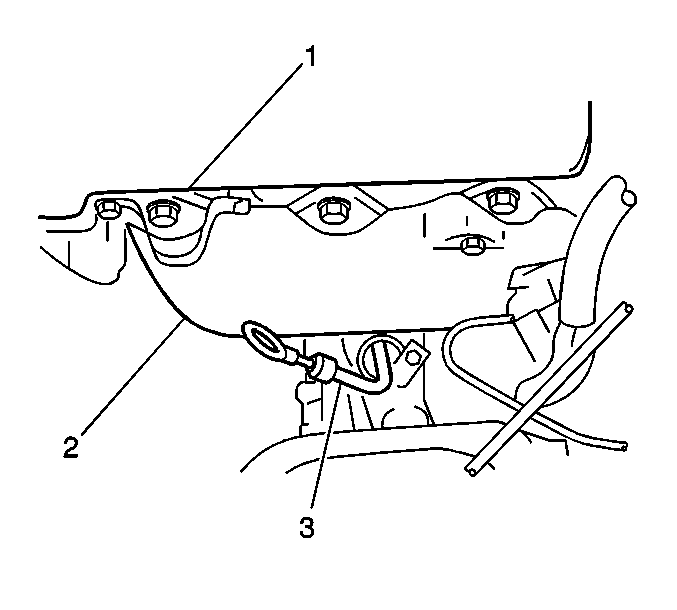
- Remove the exhaust manifold
cover bolts (1) and the cover (2).
- Raise and suitably support the vehicle. Refer to
Lifting and Jacking the Vehicle
in General Information.
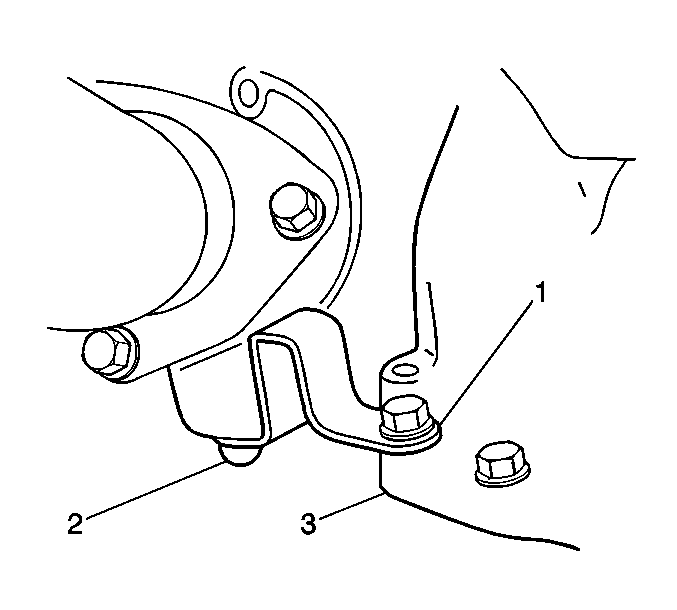
- Remove the following from
the exhaust manifold and engine block:
| • | The exhaust manifold reinforcement bracket (1) |
- Remove the front pipe. Refer to
Front Pipe Replacement
.
- Lower the vehicle.
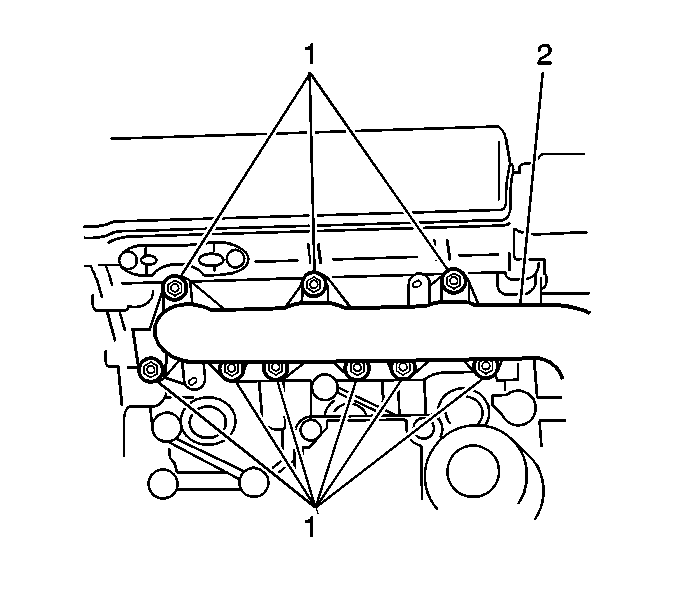
- Remove the nuts and bolts (1)
from the exhaust manifold (2).
- Remove the exhaust manifold and the gasket.
Installation Procedure

Notice: Use the correct fastener in the correct location. Replacement fasteners
must be the correct part number for that application. Fasteners requiring
replacement or fasteners requiring the use of thread locking compound or sealant
are identified in the service procedure. Do not use paints, lubricants, or
corrosion inhibitors on fasteners or fastener joint surfaces unless specified.
These coatings affect fastener torque and joint clamping force and may damage
the fastener. Use the correct tightening sequence and specifications when
installing fasteners in order to avoid damage to parts and systems.
Important: When installing a new exhaust system component, always use new gaskets
and seals.
- Install the exhaust manifold with a new gasket.
Tighten
Tighten the manifold nuts and bolts (1) to 30 N·m
(21.5 lb ft).
- Raise and suitably support the vehicle. Refer to
Lifting and Jacking the Vehicle
in General Information.

- Install the exhaust manifold
reinforcement bracket following to the exhaust manifold and engine block:
Tighten
| • | Tighten the engine mount-to-exhaust bracket bolt (1) to
54 N·m (40 lb ft). |
| • | Tighten the exhaust bracket-to-exhaust manifold nut (2)
to 50 N·m (37 lb ft). |
- Install the front pipe. Refer to
Front Pipe Replacement
.
- Lower the vehicle.

- Install the exhaust manifold
cover (2) and the cover bolts (1).
Tighten
Tighten the exhaust manifold heat shield bolts to 10 N·m
(89 lb in).
- Install the oil dipstick and tube (3) using a new O-ring.

- Attach the oxygen sensor
couplers to the mounting bracket (1) and connect the oxygen sensor
(HO2S1) electrical connectors (2).
































